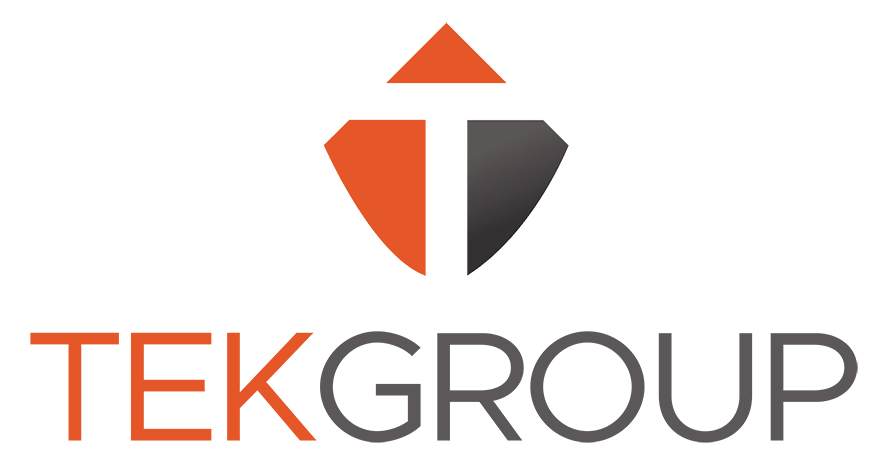One of the biggest frustrations for flooring and screeding contractors today is the length of time that a traditional sand and cement screed takes to cure.
The water content of a 75mm floating screed naturally has to be allowed to evaporate sufficiently before even light foot traffic is acceptable. This means that follow-on trades often have to wait weeks before floors are fully dry.
Continuing our commitment to new product development, TEKFLOOR has recently launched a new addition to our additives arsenal. And it’s set to revolutionise the floor screeding market.
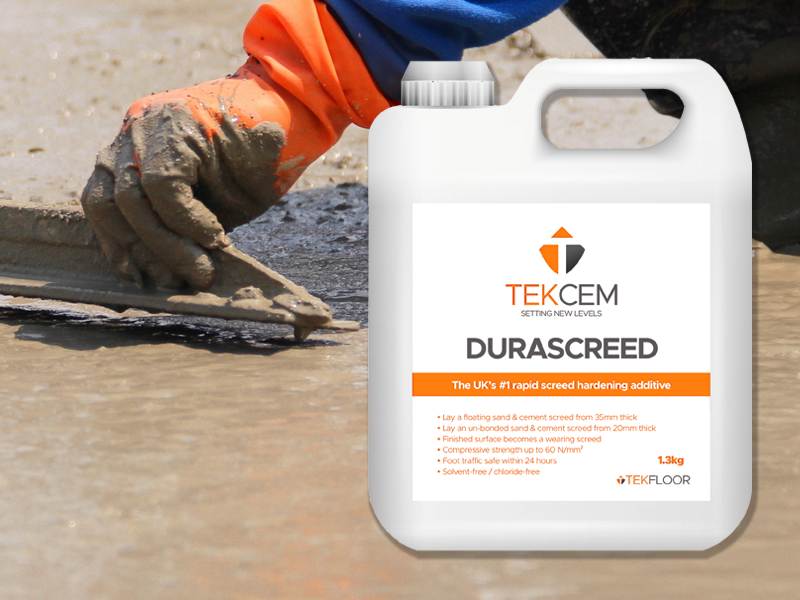
DURASCREED Screed Hardening Additive
TEKCEM DURASCREED is a technologically advanced screed hardening additive. When used in conjunction with proprietary screed mixtures, thinner screed thicknesses can be achieved without compromising compressive strength.
TEKCEM DURASCREED allows screeding operatives to lay a traditional floating sand & cement screed from 35mm thick, or an un-bonded sand & cement screed from just 20mm thick.
In both instances, the finished surface becomes a highly stressed, wearing screed that meets BS 8204 standard. It is perfect for hard granular surfacing as well as underfloor heating. Strengths of up to 60N/mm² can also be achieved, meaning there is no compromise on impact resistance or compressive performance when compared to its 75mm counterpart.
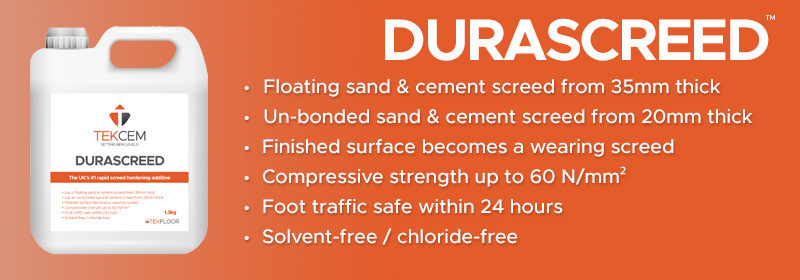
TEKFLOOR’s Commercial Director, Steve Foster said, “This is a very exciting development for the technical team here at TEKFLOOR. The industry has been crying out for a solution like this for years and it now begs a fundamental question. Why would anyone choose to lay a floating screed at 75mm thick, if they could lay it at 35mm and still achieve a 7N/mm² flexural strength and >2.0knm² working load?”
The screed hardening additive couldn’t be simpler to use since it is supplied in 1.3ltr containers. This allows for precision dosage to 2.5 bags of cement – meaning no measuring of liquid is required!
Combatting the PIR shortage
Steve went on to say “Although the construction industry is experiencing a national PIR shortage at the moment, on flooring projects where the specifier is in agreement, our customers are able to use our TEKCEM DURASCREED screed hardening additive in conjunction with our TEKWARM GPS150 insulation boards. Using a thicker insulation board with a thinner screed means that operatives can often achieve a comparable system thickness to a PIR with 75mm screed. Room heights are not overly compromised. U-values can be matched – if not improved upon. Best of all, costs are highly competitive.”
“It’s a win-win for the industry,” Steve said. “For the main contractor, there are often cost savings to be had since less sand and cement is required due to the reduction in screed thickness. There are more opportunities to move the insulation away from conventional PIR giving more flexibility. Plus the floor dries out twice as fast due to the reduced thickness.
“For the screeding contractor and follow-on trades, they obviously benefit from a more widely available insulation material, and faster laying times of a thinner screed layer.”
For further information on this exciting new product, contact the TEKFLOOR team today.
It’s no secret that the PIR insulation market has been under significant strain for several months.
The key chemical needed for the manufacture of the high-performance insulant is still in drastically short supply, and there is currently no sign of the situation improving in the short term.
For this reason, PIR and phenolic manufacturers across the globe – not just in the UK – are experiencing severe production issues which have created a market-wide PIR and phenolic shortage, extended lead times and significant double-digit price increases.
Always ready to accept a good technical challenge, Rotherham based flooring and screeding specialists, TEKFLOOR Limited, have come up with a unique solution that is enabling their customer base to speed ahead with their flooring contracts despite the insulation material shortages.
 TEKFLOOR’s Joint Managing Director, Steve Foster said, “Although there are other insulation manufacturers out there that are offering thicker EPS solutions to achieve the desired u-values, these results in increased floor zone thicknesses that make the work of secondary trades that much more difficult.
TEKFLOOR’s Joint Managing Director, Steve Foster said, “Although there are other insulation manufacturers out there that are offering thicker EPS solutions to achieve the desired u-values, these results in increased floor zone thicknesses that make the work of secondary trades that much more difficult.
“At TEKFLOOR, we have come up with the perfect alternative and our TEKWARM GPS system is helping to combat the issues the industry is facing. So much so that we are being inundated with enquiries from architects, specifiers and screeding contractors who are looking for an alternative solution.
Steve went on to say that he had literally just put the phone down after speaking to a representative of one of the UK’s largest domestic housebuilders, who was desperately trying to source stocks of 60mm PIR for an impending flooring contract.
Specifying a TEKWARM alternative
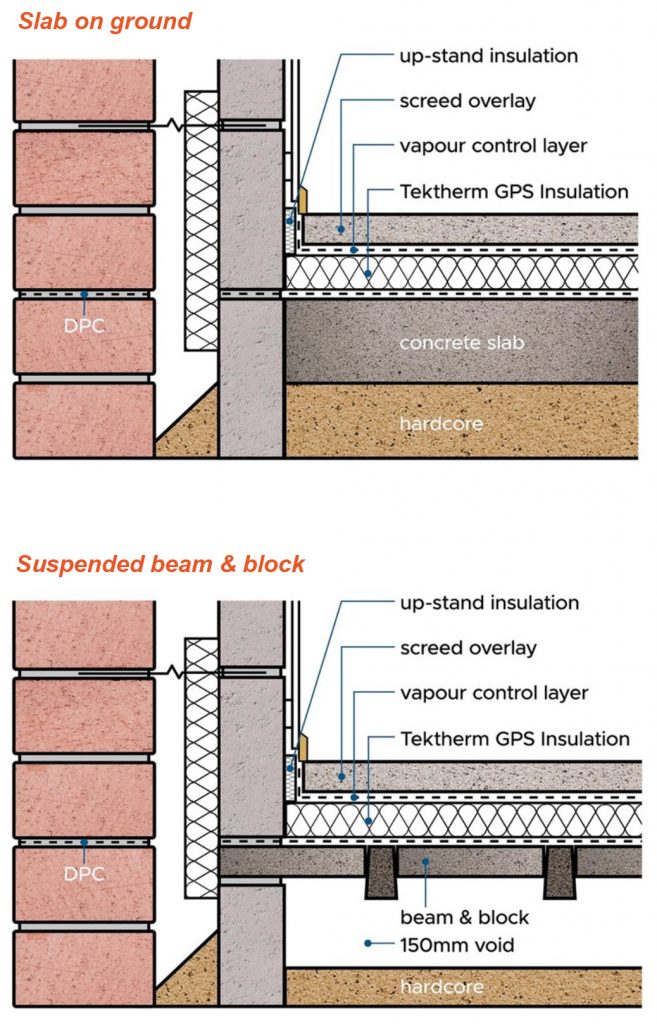 “The specification the Client was working to was based on 60mm phenolic floor insulation (at 120kPa compressive strength) with a 75mm sand and cement screed. This gave an overall system thickness of 135mm.
“The specification the Client was working to was based on 60mm phenolic floor insulation (at 120kPa compressive strength) with a 75mm sand and cement screed. This gave an overall system thickness of 135mm.
“We advised them that should they be in a position to modify the specification, we could provide an alternative system comprising 100mm TEKWARM GPS150 insulation and a 35mm floating screed containing our TEKCEM DURASCREED hardening additive. This would give them exactly the same 135mm overall system thickness.”
Since TEKWARM GPS150 graphite enhanced insulation boards have a much greater compressive strength than phenolic or PIR (150kPa as opposed to 120kPa), at increased thicknesses, they can still meet specified U-Values.
However, with an increase in insulation thickness, careful consideration needs to be given to the screed layer, to keep the thickness of the floor zone within certain tolerances.
“And this is where the magic happens” enthused Steve. “By adding our TEKCEM DURASCREED hardening additive to a sand and cement screed at 35mm thickness, the screed would still achieve a standard working load of ≥2.0kN/m2 and a flexural strength of 7N/mm2, with the added benefit of significantly reducing the drying time of the floor as the screed is laid thinner.
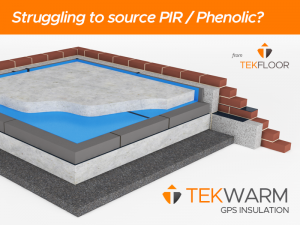 “The end result means that the client has a floor zone that matches the overall thickness and u-value requirement of the existing specification, with the added benefit of product availability and enhanced screed drying times.”
“The end result means that the client has a floor zone that matches the overall thickness and u-value requirement of the existing specification, with the added benefit of product availability and enhanced screed drying times.”
All components of the TEKWARM GPS system are available from TEKFLOOR’s distribution depots in Rotherham and Huntingdon.
For further information, customers can contact us on 03300 555227 or email info@tekfloor.co.uk
